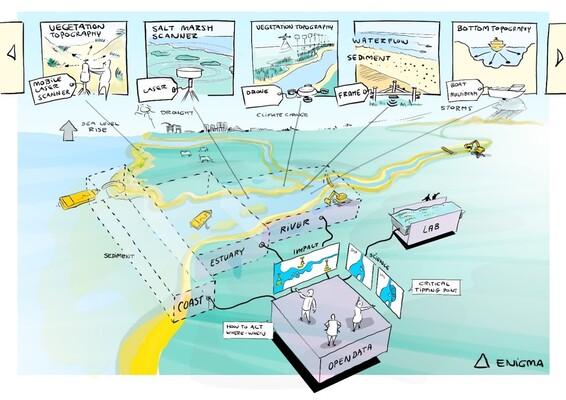Smriti Dutta1*, Gerben Ruessink1, Hans Middelkoop1
1 University of Utrecht, The Netherlands
* Corresponding author: s.dutta1@uu.nl
Introduction
Deltas and coastal plains are facing growing risks from the adverse effects of human activities and climate change, including sea-level rise. Deltas are shaped by physical forces, human interventions and physical-ecological relations. Understanding biogeomorphology — how natural forces and organisms shape these landscapes — is key to predicting the future of deltas. The Delta-ENIGMA project aims at bringing biogeomorphology research in the Netherlands to the next level, by providing a unique research infrastructure to understand how organisms, currents, waves, wind and sediment load together shape the delta landscape, including during extreme events.
Delta-ENIGMA is a 10-year NWO-funded Large Scale Research Infrastructure (LSRI) project, in which a consortium of seven Dutch institutions of NCK and NCR closely collaborate. The Delta-ENIGMA project develops a delta-scale observation network of bio-morphological processes, using state-of-the art equipment (e.g. 3D laser scanners, submerged flow and sediment monitoring, multibeam echosounders), over a 10-year period at fixed number of key-site transects across rivers, estuaries and beach-dune systems. Doing so, Delta-ENIGMA will establish the Dutch delta as a Super Site for bio-geomorphological field measurements focusing on data collection during extreme events to capture slow trends and sudden disruptions.
Objective and Methods
Delta-ENIGMA comprises 8 Work Packages that will establish the following (Figure 1):
- A long-term observation network measuring the slow and cumulative processes during normal conditions in rivers (WP1), estuaries (WP2), beaches and dunes (WP3), as well as during extreme events (WP4).
- Upgraded and new laboratory facilities to study events and conditions that are presently unobservable in the field (WP5), but may become realistic under climate change.
- A productive knowledge interaction facility (PROD) boosting interactions between experts, policymakers and delta managers (WP6).
- A coherent open database by bringing all produced sensor data into one infrastructure supporting researchers with a wealth of data for own or shared needs (WP7). Project governance (WP8).
To maximize societal impact, scientists and stakeholders will collaborate to identify strategies for implementing adaptative measures. Over the 10-year period, a comprehensive open database will accumulate results, serving as the foundation for conceptualizing delta processes, developing novel models, and validating them. The institute retrieves and processes data from sensors, adds documentation and metadata, then transfers it to Yoda platform for sharing. Yoda is Utrecht University's institutional repository for storing, publishing, and sharing research data. Effective data management is crucial, to ensure data is structured, accessible, and reusable.
Results
In 2024-the first year of the project, Delta-ENIGMA successfully achieved several keys tasks and objectives. Effective collaboration among partners and open communication facilitated the integration of expert knowledge.
WP1-WP3 identified the following field monitoring stations:
- WP1-river: Dodewaard, Vuren, Rotterdam and Hoek van Holland
- WP2-estuary: Zuidgors and Waarden, both in the Western Scheldt
- WP3-beaches and dunes: Sand Motor (nourishment), Egmond aan Zee (recreational beach) and Castricum (dynamic dune management)
Besides that, WP4-events acquired the appropriate equipment for storm events and extreme conditions, e.g. AQUADOPP, turbidity logger, ADCP’s, wave recorders, multispectral drone etc.. Various teams, involving MSc students, are being set-up to go out into the field when an extreme event is imminent.
WP5-laboratory facilities made progress with equipment procurement and with the designing of wind tunnel, mesocosm lab and the complex BioLiveFlumes lab.
WP6- PROD facility successfully designed the roadmap for 4 labs (IDlab-Deltares, Wanderlab-WUR, Serious Gaming Lab- TUD and the Design Lab- UT).
WP7-ICT designed a roadmap for the data management infrastructure. iRODS in combination with Yoda is chosen for the federated data environment.

Figure 1.










